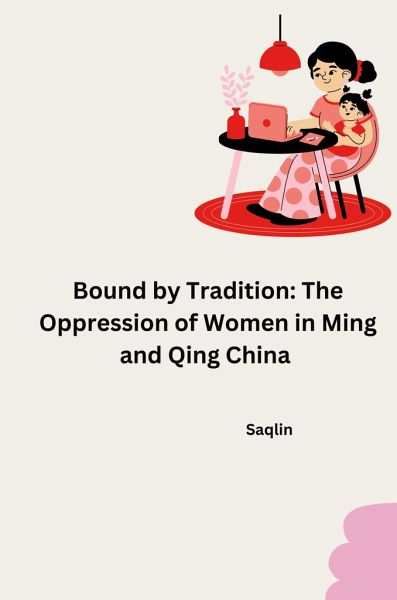
Bound by Tradition: The Oppression of Women in Ming and Qing China
Versandkostenfrei!
Versandfertig in 6-10 Tagen
28,75 €
inkl. MwSt.

PAYBACK Punkte
0 °P sammeln!
The Ming and Qing dynasties in China cast a long shadow on women's lives. "Bound by Tradition: The Oppression of Women in Ming and Qing China" explores the social and cultural structures that limited their freedoms and opportunities.Imagine a life dictated by patriarchal norms - limited education, arranged marriages, and complete subservience to men. This reality defined the existence of many women in Ming and Qing China.Confucian ideology played a central role:Filial Piety's Burden: The emphasis on obedience to fathers and husbands severely limited women's autonomy, dictating their behavior a...
The Ming and Qing dynasties in China cast a long shadow on women's lives. "Bound by Tradition: The Oppression of Women in Ming and Qing China" explores the social and cultural structures that limited their freedoms and opportunities.Imagine a life dictated by patriarchal norms - limited education, arranged marriages, and complete subservience to men. This reality defined the existence of many women in Ming and Qing China.Confucian ideology played a central role:Filial Piety's Burden: The emphasis on obedience to fathers and husbands severely limited women's autonomy, dictating their behavior and restricting their choices.Foot Binding: The brutal practice of foot binding symbolized the suppression of women's mobility and independence.Limited Education: Formal education was largely inaccessible to women, restricting their intellectual development and economic prospects.The consequences were far-reaching:Confined to Domesticity: Confucian ideals relegated women to the domestic sphere, limiting their participation in public life and social interaction.Economic Dependence: Lack of education and restricted mobility often made women financially dependent on men, further limiting their agency.Psychological Toll: The constant pressure to conform to societal expectations and the lack of autonomy could lead to feelings of isolation and powerlessness.Despite these challenges, resistance existed:Women's Literary Voices: Some women defied expectations, expressing their experiences and frustrations through poetry and literature.Foot Binding Resistance: Not all families embraced foot binding, highlighting instances of defiance against tradition.Economic Roles: Especially in rural areas, women played crucial roles in agriculture and family businesses, demonstrating agency within a constrained environment.Understanding this history is crucial. Examining the structures of oppression allows us to appreciate the struggles women faced and the resilience they displayed in navigating a restrictive society.














